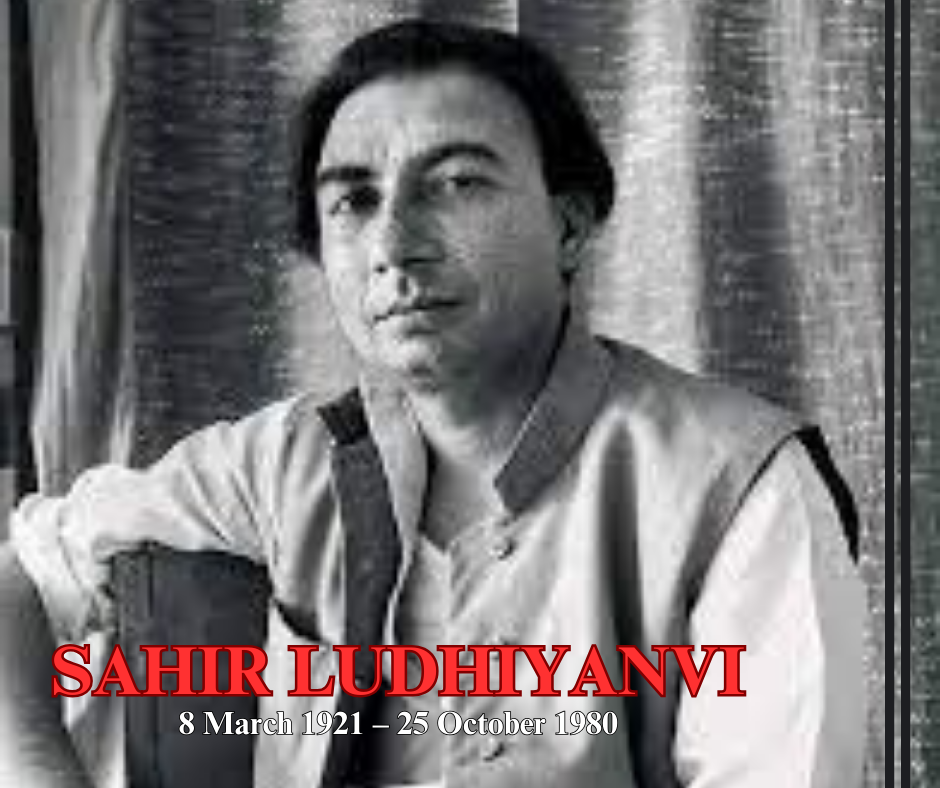
His pen name, “Sahir,” means “magician” in Urdu, and he adopted it during his early days as a poet. He studied at the Khalsa High School in Ludhiana and later at the Government College in Ludhiana.
Sahir Ludhianvi, whose name is enough to describe his personality. His powerful and socially conscious poetry made him one of the most influential lyricists in the history of Indian cinema. Sahir’s real name was Abdul Hayee and he was born on March 8, 1921, in Ludhiana, Punjab.
Sahir Ludhianvi was born into a family of zamindars (landowners) in Ludhiana, Punjab. He experienced the socio-economic disparities and injustices of his time, which deeply influenced his poetry and lyrics.
Sahir Ludhianvi began writing poetry from a young age and became associated with the Progressive Writers’ Association, a group of writers who used their work to critique social and political issues.
His poetry often revolved around themes of social inequality, injustice, and the human condition. Some of his famous works include Parchaiyan and Talkhiyan.
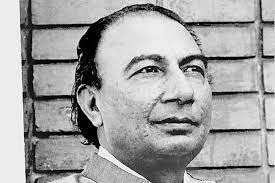
Picture: Social Media
In the 1940s, Sahir moved to Bombay (now Mumbai) to pursue a career in the film industry. His initial days in Bombay were challenging, but he eventually gained recognition for his poetry and began writing lyrics for films.
Sahir Ludhianvi’s career as a film lyricist took off with the film “Azadi Ki Raah Par” (1949). His lyrics for the song ‘Badal Rahi Hai Zindagi’ brought him to the industry’s attention.
He went on to work with some of the most prominent music directors and composers in the Indian film industry, including S.D. Burman, Ravi, Roshan, and Khayyam.
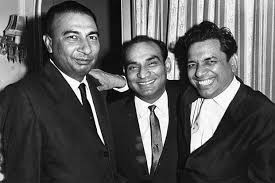
Picture: Social Media
Sahir Ludhianvi’s lyrics are celebrated for their depth and social relevance. Some of his most famous songs include “Thandi Hawayein Lehrake Aaye” sung by Lata Mangeshkar, composer S. D. Burman in Naujawan (1951).
“Jayen To Jayen Kahan” sung by Talat Mahmood, composer S. D. Burman in Taxi Driver (1954).
“Aana Hai To Aa”, sung by Mohammed Rafi, in Naya Daur (1957) O.P. Nayyar, composer.
“Saathi Haath Badhana” in Naya Daur (1957), sung by Mohammed Rafi and Asha Bhonsle.
“Jane Kya Tune Kahi” sung by Geeta Dutt, “Jane Woh Kaise” sung by Hemant Kumar and “Yeh Duniya Agar Mil Bhi Jaye Toh Kya Hai” sung by Mohammed Rafi in Pyaasa (1957) S.D. Burman, composer.
“Aurat Ne Janam Diya Mardon Ko” sung by Lata Mangeshkar, in Sadhna (1958) Datta Naik, composer.
“Chin-o-Arab Hamara Hindustan Hamara”, sung by Mukesh in Phir Subah Hogi (1959) Khayyam, composer.
“Tu Hindu Banega Na Musalman Banega”, sung by Mohammed Rafi in Dhool Ka Phool (1959) Datta Naik, composer.
“Yeh Ishq Ishq Hai”, sung by Mohammed Rafi and Manna De in Barsaat Ki Raat (1960) Roshan, composer.
“Na To Karvan Ki Talash Hai”, sung by Mohammed Rafi, Manna De, Asha Bhonsle and Sudha Malhotra in Barsaat Ki Raat (1960) Roshan, composer.
“Allah Tero Naam Ishwar Tero Naam’, sung by Lata Mangeshkar in Hum Dono (1961) Jaidev, composer.
“Main Zindagi Ka Sath Nibhata Chala Gaya”, Hum Dono (1961) sung by Mohammed Rafi, Jaidev composer.
“Kabhi Khud Pe Kabhi Haalat Pe Rona Aaya”, Hum Dono (1961) sung by Mohammed Rafi, Jaidev, composer.
“Abhi Na Jao Chhodkar Ke Dil Abhi Bhara Nahin”, Hum Dono (1961) sung by Mohammed Rafi, Asha Bhosle, Jaidev, composer.
“Chalo Ek Baar Phir Se Ajnabi Ban Jaye Hum Dono’, sung by Mahendra Kapoor in Gumrah (1963) Ravi, composer.
Laaga Chunri Mein Daag” sung by Manna Dey in Dil Hi To Hai (1963 film), Roshan as the composer.
“Aye Meri Zoharjabin”, Waqt (1965) sung by Manna Dey, Ravi (music director).
“Aagey Bhi Jane Na Tu”, film Waqt (1965) sung by Asha Bhonsle, Ravi, composer.
“Tum Agar Saath Dene Ka Wada Karo”, sung by Mahendra Kapoor in Hamraaz (1967), Ravi, composer.
“Neele Gagan Ke Tale”, Hamraaz (1967) sung by Mahendra Kapoor, Ravi composer.
“Ye Dil Tum Bin Kahin Lagata Nahin”, Izzat (1968) Lata-Rafi, Laxmikant–Pyarelal.
“Babul Ki Duaen Leti Ja”, sung by Muhammed Rafi in Neelkamal (1968).
“Man Re Tu Kahe Na Dheer Dhare”, sung by Mohammed Rafi and “Sansar Se Bhage Phirte Ho, Bhagwan Ko Tum Kya Paoge” sung by Lata Mangeshkar in Chitralekha (1964) Roshan, composer.
“Tora Mann Darpan Kehlaye”, sung by Asha Bhosle in Kaajal (1965) Ravi, composer.
“Ishwar Allah Tere Naam”, sung by Mohammed Rafi in Naya Raasta (1970) Datta Naik, composer.
“Chala Bhi Aa Aja Rasiya”, Man Ki Aankhe (1970) Lata-Rafi, Laxmikant–Pyarelal.
“Na Tu Zameen Ke Liye Na Aasaman Ke Liye”, Dastaan (1972) Mohammad Rafi, Laxmikant–Pyarelal.
“Mere Dil Mein Aaj Kya Hai”, Daag (1973) sung by Kishore Kumar, Laxmikant Pyarelal, composer.
“Main Pal Do Pal Ka Shair Hoon”, sung by Mukesh in Kabhi Kabhi (1976) Khayyam, composer.
“Kabhie Kabhie”, sung by Mukesh, Lata Mangeshkar in Kabhi Kabhi (1976), Khayyam, composer.
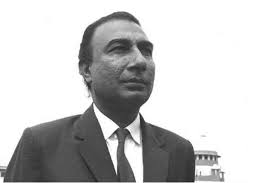
Picture: Social Media
Sahir Ludhianvi received several awards and honours during his career, including the Filmfare Award for Best Lyricist multiple times. He also received the Padma Shri in 1971.
Sahir Ludhianvi was known for his strong, independent, and often rebellious personality. His personal life was marked by various relationships, including a well-known association with the renowned writer and poet Amrita Pritam.
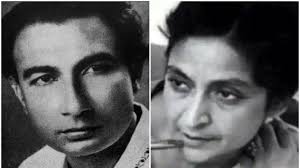
Picture: Social Media
Sahir Ludhianvi’s lyrical brilliance, poignant poetry, and commitment to social issues left an indelible mark on Indian cinema. He is celebrated not only for the beauty of his lyrics but also for their underlying social and political messages.
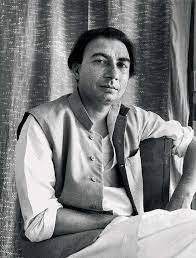
Picture: Social Media
Sahir Ludhianvi passed away on October 25, 1980, leaving behind a vast body of work that continues to inspire and resonate with people.
Sahir Ludhianvi remains a literary and cultural icon in India. His contribution to the world of poetry and Hindi film music is celebrated to this day, and his lyrics continue to be cherished by music enthusiasts and those who appreciate the power of words to address societal issues and emotions.